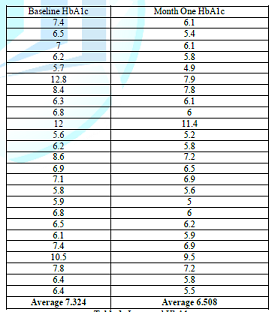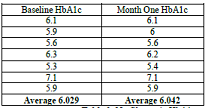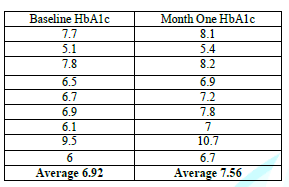Mini-Research :
John F Burd and Vivianne
Noetzel Diabetesmellitus is a leading and increasing cause of morbidity and mortality worldwide
[1]. The causes of type-2 diabetes are multi-factorial, and supplements can
play an important role on its incidence, severity and management [2]. Hence
studies have frequently focused on dietary components beneficial in the
prevention and treatment of diabetes. Recent studies have demonstrated that
numerous herbal and nutraceutical products have beneficial effects in patients
by improving glucose and lipid metabolism, antioxidant status, disease
progression and capillary function [3]. Lysulin™ is a new, patent pending nutritional supplement for people with Type 2
diabetes and prediabetes and those at risk of developing diabetes and metabolic
syndrome [4]. Lysulin is manufactured in the USA and contains 3 active
ingredients: Lysine (essential amino acid), Zinc (micronutrient) and Vitamin C
(plus other standard excipients) and is manufactured by Lysulin Inc, San Diego,
CA (www.lysulin.com). All three of the active ingredients have been shown (in
more than 20 years of R&D and clinical studies) to lower blood glucose,
lower glycated proteins and improve the lipid profile by lowering
triglycerides, cholesterol and LDL and raising HDL. Daily use of Lysulin™ may
slow or halt the progression of prediabetes to diabetes and slow or halt the
progression of diabetes complications by lowering protein glycation [5,6]. In addition to this double-blind study, we have also studied volunteers who
started using Lysulin and self-measured their HbA1c using the A1cNow home test
kit at baseline and then one month after starting Lysulin [8]. In addition to
37 subjects with Type 2 diabetes, we also observed 4 subjects with Type 1
diabetes, all of whom were using a DexCom continuous glucose monitor (CGM) with
a hypoglycemia alarm. This precaution was sufficient to alleviate our concern
about potential
hypoglycemia for people with Type 1 diabetes using insulin, in combination with
Lysulin, as both reduce blood glucose [9]. The
results for the 37 volunteers are shown in the following Tables 1-3. Improved HbA1c required an improvement of at least
0.2%. No change in HbA1c meant that the HbA1c changes were plus or minus 0.1%. For
the group labeled Increase in HbA1c, this group had an elevation of at least
0.2% after 1 month. Another 7 (17 %) had no increase in their HbA1c with an average HbA1c of 6.029
going to 6.042. Another group of 9 volunteers (22%) saw an increase in their HbA1c after 1
month, with the average HbA1c going from 6.92 at baseline to 7.56 at 1 month. Using all 41 volunteers, the average HbA1c went from 7.015% to 6.658% in just 1
month. An average drop of 0.357 in just one month. None of the volunteers reported any side effects or other problems which could
be ascribed to Lysulin. Ideally, of
course, all volunteers would see an improvement in their HbA1c. However, it is
noteworthy that Pharmaceutical executives have openly admitted that
prescription medications only work in 30 to 50% of patients taking them [10]. Accordingly,
our results revealing that 61% see an improvement is in line with this
observation. In addition, nearly 20% saw no change in their HbA1c. This result
allows for the possibility that, had they not taken Lysulin, that they may have
seen an increase in HbA1c. To be clear, this possibility is speculative but a
point worth considering nonetheless. There are at least two possible reasons
for an increase in HbA1c seen in Lysulin users in this study. The first is that
these individuals may have been having a large increase in HbA1c and that
Lysulin effectively tempered the rise in HbA1c, which would have occurred in
the absence of Lysulin. Another possible reason is that these individuals
experienced a difficulty in absorbing Lysulin from their stomach and into their
bloodstream. Further investigations are in progress to examine both of these
possibilities and find a solution to further improve the effectiveness in
Lysulin in lowering HbA1c. These results confirm the excellent results observed in the double-blind study
reported earlier [7]. In addition, these results also confirm that home testing
for HbA1c on a monthly basis may lead to more effective diabetes management,
especially after a change in treatment [7]. Further clinical studies are underway to firmly establish the usefulness of
Lysulin in bettering the health of people with diabetes by lowering glucose
toxicity and improving glycemic control. 2.
Bantle
JP, Wylie-Rosett J, Albright AL, Apovian CM, Clark NG, et al. Nutrition
Recommendations and Interventions for Diabetes: A position statement of the
American Diabetes Association (2010) Diabetes Care 31: 61-78. https://doi.org/10.2337/dc08-S061 3.
Nasri
H, Baradaran A, Shirzad H and Rafieian-Kopaei M. New Concepts in Nutraceuticals
as Alternative for Pharmaceuticals (2014) Int J Prev Med 5: 1487-1499. 4.
Burd
J. Lysulin™, a new supplement for Nutritional Support for People with Diabetes
and Pre-diabetes (those at risk of developing diabetes) (2018) Diabetes
Management 8: 38-40. 5.
Ranasinghe
P, Wathurapatha WS, Galappatthy P, Katulanda P, Jayawardena R, et al. Zinc
supplementation in prediabetes: A randomized double-blind placebo-controlled
clinical trial (2017) J Diabetes 10: 386-397. https://doi.org/10.1111/1753-0407.12621 6.
Jafarnejad
A, Bathaie1 SZ, Nakhjavani M, Hassan MZ and Banasadegh S. The improvement
effect of L-Lys as a chemical chaperone on STZ-induced diabetic rats, protein
structure and function (2008) Diabetes Metab Res Rev 24: 64–73. https://doi.org/10.1002/dmrr.769 7.
Burd J, Noetzel V, Gonzales A and Malero
AA. A Double-Blind Placebo Controlled Pilot Study of Daily Oral Supplementation
of Lysulin® in People with Type 2 Diabetes. Diabetes Management. In Press. 8.
Heather
P, Whitley HP, Yong EV and Rasinen C. Selecting an A1C point-of-vare instrument
(2015) Diabetes Spectrum 28: 201-208. 9.
Kalogeropoulou
D, LaFave L, Schweim K, Gannon MC, Nuttall FQ. Lysine ingestion markedly
attenuates the glucose response to ingested glucose without a change in insulin
response (2009) The Am J Clin Nutr 90: 314-320. https://doi.org/10.3945/ajcn.2008.27381 Burd JF, Lysulin,
Inc., 3525A Del Mar Heights Road, Suite 398, San Diego, California, USA, Tel:
619-992-2873, E-mail: jburd@jburd.com Burd JF and Noetzel V. People with type 2 diabetes
see considerable HbA1c improvement in 1 month using lysulin (2018) J Obesity
and Diabetes 2: 11-12 Diabetes mellitus, Insulin, Lysulin, Blood
glucose, HypoglycemiaPeople with Type 2 Diabetes See Considerable HbA1c Improvement in 1 Month Using Lysulin
Abstract
Full-Text
A recent double-blind, placebo-controlled study of Lysulin intervention in 67
Type 2 diabetes patients demonstrated a significant improvement in HbA1c of
1.4% in 6 months and noted that HbA1c drops were first seen in as little as 1
month after initiation of Lysulin [7]. The number of subjects receiving 3
servings per day of Lysulin in this study was 18, 11 of which showed an
improvement in their HbA1c. For these 11 subjects, the HbA1c drop in 6 months
was 1.91% [7].


Corresponding author:
Citation:
Keywords